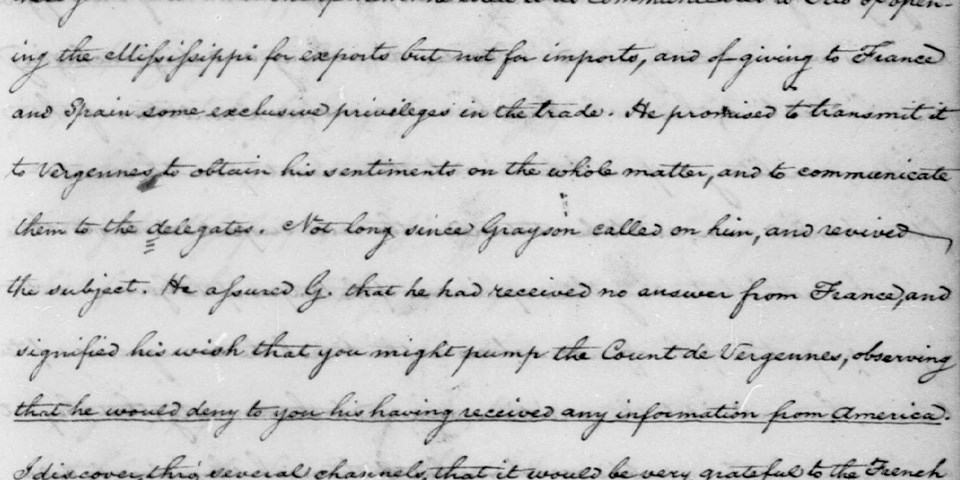Part of a series of articles titled The Constitutional Convention: A Day by Day Account for July 16 to 31, 1787.
Article
July 18, 1787: A Republican Form of Government

Library of Congress, https://www.loc.gov/resource/mjm.27_1546_1551/?sp=3
"[I] have little doubt that the people will be as ready to receive as we shall be able to propose, a Government that will secure their liberties & happiness."
--James Madison (VA) to Thomas Jefferson
On this day, Madison’s (VA) notes say that New Jersey and Georgia were absent. Houstoun (GA) is mentioned as participating in the day’s debates, but a state could not be meaningfully represented and have their vote tallied with only one delegate present. Since Rhode Island never sent delegates to the Convention, New Hampshire’s hadn’t arrived yet, and New York’s had left, never to return (except for Hamilton), only eight of the thirteen states were effectually represented in the Constitutional Convention today. No more than eleven states had voting delegations present at any single time throughout the Convention.
The day began with two important unanimous votes:
- The national executive could veto legislation, and his veto could only be overridden by two-thirds of each house of the legislature.
- "A National Judiciary shall be established, to consist of one supreme tribunal.”
There was then an extensive debate over how to choose federal judges. Three options were discussed:
- The national executive would appoint judges.
- The second house of the national legislature would appoint judges.
- The national executive would appoint judges with the advice and consent of the second house.
Much of the debate centered on which was more in danger of getting corrupted: a national executive (one man), who might be partial to his home state or to the state where the national capital was located; or a house of the legislature, which might fall into scheming and factionalism.
The Convention, with no noted debate, unanimously decided that federal judges would serve lifetime, salaried appointments. After some debate, they also unanimously agreed to give the legislature authority to create lower courts in the federal judiciary.
The Convention unanimously decided that in the national judiciary “the jurisdiction shall extend to all cases arising under the national laws; and to such other questions as may involve the national peace and harmony” and that new states could be admitted to the union.
Next, they considered a resolution that “a republican Constitution and its existing laws ought to be guaranteed to each State by the United States.”
G. Morris (PA) immediately objected, since he was “very unwilling that such laws as exist in Rhode Island should be guaranteed.” Wilson thought that this was a misunderstanding, since the resolution’s purpose was “merely to secure the States against dangerous commotions, insurrections and rebellions.”
Mason (VA) argued that “if the General Government should have no right to suppress rebellions against particular States, it will be in a bad situation indeed. As rebellions against itself originate in and against individual States, it must remain a passive spectator of its own subversion,” without this resolution.
Randolph (VA) liked both purposes he saw in the resolution: “first, to secure a republican government; secondly, to suppress domestic commotions.”
Madison moved, and McClurg (VA) seconded, to make the intent clearer by using this language: “the constitutional authority of the States shall be guaranteed to them respectively against domestic as well as foreign violence.”
Houstoun (GA) didn’t like this language, since he thought his home state’s constitution was “very bad” and he didn’t want the national government to be obliged to support it.
L. Martin (MD) wanted states to be left to themselves when suppressing insurrections, which Gorham strongly disagreed with.
Wilson proposed that the best language would be “that a republican form of Government shall be guaranteed to each State; and that each State shall be protected against foreign and domestic violence.” Madison agreed that this was better than his motion, and the Convention then unanimously approved Wilson’s wording before adjourning.
- The day was productive but ill-attended, with only eight states functionally represented.
- The national executive was granted a veto that could be overruled by two-thirds of each house of the legislature.
- A national judiciary was established with a “supreme tribunal.”
- Delegates could not decide how federal judges would be appointed but did decide unanimously that they would have lifetime, salaried appointments.
- For the national judiciary, “the jurisdiction shall extend to all cases arising under the national laws; and to such other questions as may involve the national peace and harmony.”
- It was decided that new states could be admitted to the union.
- The legislature was given the authority to create lower courts.
- After much haggling, the delegates approved this language: “that a republican form of Government shall be guaranteed to each State; and that each State shall be protected against foreign and domestic violence.”
- Johnson (CT) dined at Mrs. Wilson's and paid her bill for 30 shillings. Apparently finding City Tavern too expensive, he seems to have moved to a boarding house.
- In the letter quoted at the top, Madison (VA) also informed Jefferson that the severe devaluation of Pennsylvania’s paper money had almost caused a riot a few days earlier. He feared that similar calamity could happen in Virginia. Madison entrusted this letter to Edward Carrington, who was instructed to have John Paul Jones carry it to Paris, where Jefferson was the American ambassador.
- Franklin (PA) entertained Noah Webster at tea.
- After a relatively cool morning, the day was clear and hot.
- The Pennsylvania Packet described a woman who had “been attacked by an ignorant and inhuman mob” after being accused of witchcraft.
Last updated: September 21, 2023
